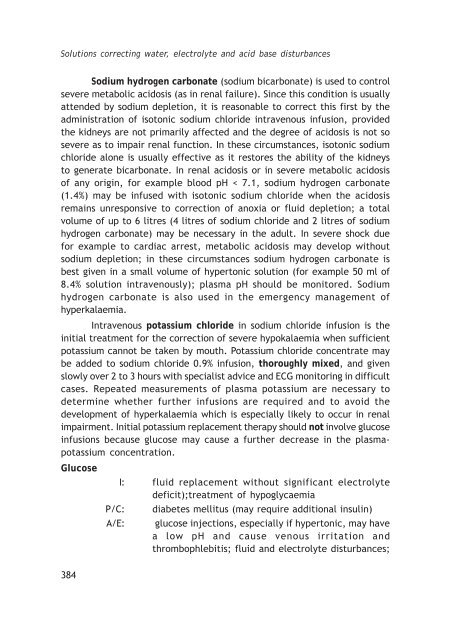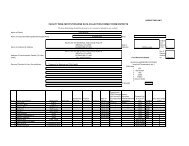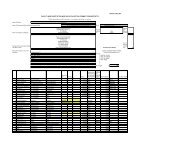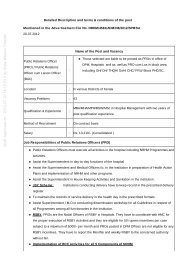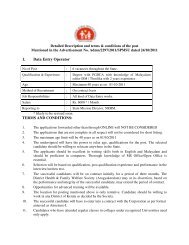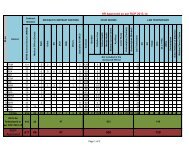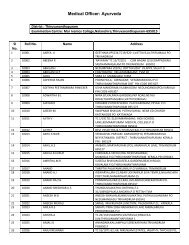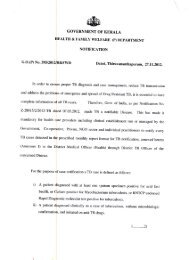- Page 2 and 3:
KERALA STATE DRUG FORMULARY NUMBER
- Page 4 and 5:
CENTRAL DRUG FORMULARY COMMITTEE CH
- Page 6 and 7:
LIST OF CONTRIBUTORS 1. Dr. K.V. Kr
- Page 8 and 9:
FOREWORD Medicines play a crucial r
- Page 10 and 11:
Dr. V. Geetha, Director of Medical
- Page 12 and 13:
ABBREVIATIONS A/E .................
- Page 14 and 15:
Antiretroviral drugs ..............
- Page 16 and 17:
Dyes used in ophthalmology ........
- Page 18 and 19:
Antipsychotic drugs ...............
- Page 20 and 21:
Eclampsia .........................
- Page 23 and 24:
PART - I GENERAL ADVICE TO PRESCRIB
- Page 25 and 26:
General advice to Prescribers Monit
- Page 27 and 28:
General advice to Prescribers Pharm
- Page 29 and 30:
General advice to Prescribers refil
- Page 31 and 32:
General advice to Prescribers neces
- Page 33 and 34:
General advice to Prescribers 2C19
- Page 35 and 36:
General advice to Prescribers possi
- Page 37 and 38:
General advice to Prescribers Cost
- Page 39 and 40:
General advice to Prescribers Did w
- Page 41 and 42:
Inhalational agents I:, C/I:,D/I: s
- Page 43 and 44:
Intravenous General Anaesthetics Re
- Page 45 and 46:
Local Anaesthetics anaesthesia. Low
- Page 47 and 48:
Local Anaesthetics A/E: P/A: Dose:
- Page 49 and 50:
Preoperative Medication PREOPERATIV
- Page 51 and 52:
Preoperative Medication A/E: P/A: D
- Page 53 and 54:
SECTION - 2 ANALGESICS, ANTIPYRETIC
- Page 55 and 56:
Non-Steroidal Anti-Inflammatory Dru
- Page 57 and 58:
Non-Steroidal Anti-Inflammatory Dru
- Page 59 and 60:
Non-Steroidal Anti-Inflammatory Dru
- Page 61 and 62:
Opioid Analgesics P/A : Injection:
- Page 63 and 64:
Opioid Analgesics pain, 100 mg init
- Page 65 and 66:
Drugs in Rheumatoid Disorders P/A:
- Page 67 and 68:
Drugs in Rheumatoid Disorders IMPOR
- Page 69 and 70:
Medicines used for Gout Dose: Admin
- Page 71 and 72:
SECTION - 3 ANTI CONVULSANTS/ANTIEP
- Page 73 and 74:
Antiepileptics A/E: Cardiovascular
- Page 75 and 76:
Antiepileptics Ethosuximide I: Drug
- Page 77 and 78:
Antiepileptics hypotonia, coordinat
- Page 79 and 80:
Antiepileptics Topiramate I: Adjunc
- Page 81 and 82:
Antiepileptics Felbamate I: Unrespo
- Page 83 and 84:
SECTION - 4 ANTIINFECTIVE DRUGS ANT
- Page 85 and 86:
Pencillins Phenoxymethyl penicillin
- Page 87 and 88:
Cephalosporins Cephazolin I: Surgic
- Page 89 and 90:
Pencillins Cefdinir I: Pneumonia, c
- Page 91 and 92:
Aminoglycosides Gentamicin I: Urina
- Page 93 and 94:
Broad spectrum antibiotics I: Ricke
- Page 95 and 96:
Macrolides pertussis, endemic trach
- Page 97 and 98:
Macrolides photosensitivity; hepati
- Page 99 and 100:
Teicoplanin Cost: Tab 50 mg (10) Rs
- Page 101 and 102:
Fluoroquinolones A/E: Nausea, epiga
- Page 103 and 104:
Sulphonamides A/E: same as in cipro
- Page 105 and 106:
Antifungal drugs Sulphacetamide I:
- Page 107 and 108:
Antiviral drugs ANTI VIRAL DRUGS An
- Page 109 and 110:
Non selective antiviral drugs Dose:
- Page 111 and 112:
Antiretroviral drugs Dose: Oral, 30
- Page 113 and 114:
Antiretroviral drugs A/E : Rash inc
- Page 115 and 116:
Antimalarial drugs Artesunate I: Ml
- Page 117 and 118:
Antimalarial drugs Quinine I: Acts
- Page 119 and 120:
Antiamoebic and other protozoal dru
- Page 121 and 122:
Anthelmintics drugs Other drugs use
- Page 123 and 124:
Antifilarial drugs SCHISTOSOMICIDES
- Page 125 and 126:
SECTION - 5 ANTIMIGRAINE MEDICINES
- Page 127 and 128:
SECTION 6 ANTINEOPLASTIC DRUGS ALKY
- Page 129 and 130:
Antimetabolites Cost : Inj: 1 g via
- Page 131 and 132:
Antineoplastic Drugs Cost : 5-Fluor
- Page 133 and 134:
Cytotoxis Antibiotics P/A: Injectio
- Page 135 and 136:
Mitotic Inhibitors Epirubicin I: Ca
- Page 137 and 138:
Hormones and Hormonal antagonists P
- Page 139 and 140:
Targeted agents Progestins Medroxy
- Page 141 and 142:
Cytoprotective agents A/E: Infusion
- Page 143 and 144:
Dopaminergic agonist P/A: Dose: Bro
- Page 145 and 146:
MAO B Inhibitor MAO B Inhibitor Sel
- Page 147 and 148:
Central Anticholinergics daily (wit
- Page 149 and 150:
SECTION - 8 DRUGS ACTING ON BLOOD A
- Page 151 and 152:
Drug affecting Coagulation P/C: Can
- Page 153 and 154:
Haemolytic Anaemias HAEMOLYTIC ANAE
- Page 155 and 156:
Iron chelating drugs iron, aluminiu
- Page 157 and 158:
Acute Myelogenous Leukemia (All Tra
- Page 159 and 160:
Chronic Lymphocytic Leukemia dyspne
- Page 161 and 162:
Antiplatelet drugs Dose: 300 mg in
- Page 163 and 164:
Thrombolytic drugs Cost: lnj vial (
- Page 165 and 166:
Antifibrinolytics Tranexamic acid P
- Page 167 and 168:
Whole Blood/Components Storage and
- Page 169 and 170:
Plasma substitutes I: Short-term bl
- Page 171 and 172:
Plasma fractions for specific use H
- Page 173 and 174:
SECTION 10 CARDIOVASCULAR DRUGS DRU
- Page 175 and 176:
Drugs for Angina Dose : Oral : 10 m
- Page 177 and 178:
Drugs for Angina I : Angina pectori
- Page 179 and 180:
Lipid Lowering Drugs A/E: Reversibl
- Page 181 and 182:
Antihypertensive Drugs failure,neph
- Page 183 and 184:
Antihypertensive Drugs D/I: Arrhyth
- Page 185 and 186:
Antihypertensive Drugs Labetolol I:
- Page 187 and 188:
Antihypertensive Drugs Parenteral :
- Page 189 and 190:
Antihypertensive Drugs Mainly these
- Page 191 and 192:
Antihypertensive Drugs Alpha Methyl
- Page 193 and 194:
Antihypertensive Drugs Dose : In hy
- Page 195 and 196:
Drugs for Pulmonary Hypertension D/
- Page 197 and 198:
Drugs for Heart Failure Dopamine Do
- Page 199 and 200:
Anti Arrhythmic Drugs Dose: 250 - 5
- Page 201 and 202:
Anti Arrhythmic Drugs enzyme elevat
- Page 203 and 204:
Positive inotropic agents Dose : 2.
- Page 205 and 206:
Drugs for Superficial Mycosis P/A:
- Page 207 and 208:
Drugs for Deep Mycosis D/I: Increas
- Page 209 and 210:
Anti Bacterial for Topical Use P/C:
- Page 211 and 212:
Drugs used for Psoriasis Dithranol
- Page 213 and 214:
Drugs used for Warts P/C: Avoid use
- Page 215 and 216:
Drugs for other Dermatological Cond
- Page 217 and 218:
Drugs for other Dermatological Cond
- Page 219 and 220:
Drugs forLeprosy Rifampicin I: Lepr
- Page 221 and 222:
SECTION 12 DIAGNOSTIC AGENTS RADIOC
- Page 223 and 224:
Diagnostic agents A/E: Nausea, vomi
- Page 225 and 226:
Diagnostic agents reactions;hyperth
- Page 227 and 228:
SECTION 13 DISINFECTANTS AND ANTISE
- Page 229 and 230:
Disinfectants And Antiseptics ADMIN
- Page 231 and 232:
Disinfectants And Antiseptics Gluta
- Page 233 and 234:
Loop Diuretics P/A: Dose: Tablets 4
- Page 235 and 236:
Osmotic Diuretics D/I: Increases di
- Page 237 and 238:
SECTION 15 DRUGS USED IN DENTISTRY
- Page 239 and 240:
Drugs for Dentistry STEROIDS Triamc
- Page 241 and 242:
Drugs for ENT A/E: P/A: Candidiasis
- Page 243 and 244:
Drugs for ENT C/I : Hypersensitivit
- Page 245 and 246:
Ulcer Healing Drugs mecamylamine,ps
- Page 247 and 248:
Antispasmodics syndrome. Lansoprazo
- Page 249 and 250:
Antiemetics And Prokinetics radioth
- Page 251 and 252:
Anti Diarrhoeals gastroenteritis an
- Page 253 and 254:
Laxatives osteomalacia; complete de
- Page 255 and 256:
Drugs Used In Inflammatory Bowel Di
- Page 257 and 258:
Drugs Used In Gall Stones and Heamo
- Page 259 and 260:
SECTION 18 HORMONES AND OTHER ENDOC
- Page 261 and 262:
Adrenal Hormones And Synthetic Subs
- Page 263 and 264:
Adrenal Hormones And Synthetic Subs
- Page 265 and 266:
Antiandrogens Ointment 2 % w/w, 5 %
- Page 267 and 268:
Oestrogens And AntiOestrogens A/E:
- Page 269 and 270:
Progestins And Antiprogestins A/E :
- Page 271 and 272:
Insulin and Other Anidiabetic Drugs
- Page 273 and 274:
Insulin and Other Anidiabetic Drugs
- Page 275 and 276:
Thyroid and Anit Thyroid Drugs Cost
- Page 277 and 278:
Vitamin D Derivatives orally. Anxie
- Page 279 and 280:
Bisphosphonates Dose: Hypercalcemia
- Page 281 and 282:
Sera and immunoglobulins Hypersensi
- Page 283 and 284:
Vaccines Hepatitis B Immunoglobulin
- Page 285 and 286:
Vaccines Dose: Primary immunization
- Page 287 and 288:
Vaccines Child:1-15 years: IM, 0.5
- Page 289 and 290:
SECTION 20 IMMUNOSUPPRESSANT DRUGS
- Page 291 and 292:
Cytotoxic drugs A/E: Hypersensitivi
- Page 293 and 294:
Glucocorticoids I : C/I: P/C : A/E:
- Page 295 and 296:
Drug treatment of Urolithiasis I: I
- Page 297 and 298:
Benign prostatic hypertrophy Terazo
- Page 299 and 300:
Urinary Frequency and Enuresis Dose
- Page 301 and 302:
Drugs For Impotence A/E : Penile pa
- Page 303 and 304:
SECTION 22 MUSCLE RELAXANTS AND ANT
- Page 305 and 306:
Central Muscle Relaxants Botulinum
- Page 307 and 308:
Peripheral Muscle Relaxant D/I: Sam
- Page 309 and 310:
Anticholinesterases C/I: P/C: A/E:
- Page 311 and 312:
SECTION 23 OPHTHALMOLOGICAL PREPARA
- Page 313 and 314:
Corticosteroids used in Ophthalmolo
- Page 315 and 316:
Drug used for Glaucoma Antagonists
- Page 317 and 318:
Nutritional Disorders affecting the
- Page 319 and 320:
Drugs and Pregnancy Drugs to be avo
- Page 321 and 322:
Oxytocics The drip is started with
- Page 323 and 324:
Drugs for Induction of Labour PROST
- Page 325 and 326:
Drugs for Vaginitis 2. Oral : fluco
- Page 327 and 328:
Drugs for Dysfunctional Uterine Ble
- Page 329 and 330:
SECTION 25 PSYCHOTHERAPEUTIC DRUGS
- Page 331 and 332:
Antipsychotic Drugs Fluphenazine Hy
- Page 333 and 334:
Antipsychotic Drugs start initially
- Page 335 and 336:
Antipsychotic Drugs dose upto 200 m
- Page 337 and 338:
Antipsychotic Drugs Discontinue, if
- Page 339 and 340:
Antidepressants reduction of effect
- Page 341 and 342:
Antidepressants Doxepin I: Depressi
- Page 343 and 344:
Antidepressants Citalopram I, A/E a
- Page 345 and 346:
Antidepressants P/C: Renal or hepat
- Page 347 and 348:
Anxiolytics C/I: P/C: A/E: P/A: Dos
- Page 349 and 350:
Anxiolytics Adjunct in acute alcoho
- Page 351 and 352:
Drugs used in substance dependence
- Page 353 and 354:
SECTION 26 PAEDIATRIC DRUGS AND NUT
- Page 355 and 356: Paediatric drugs 333
- Page 357 and 358: Paediatric drugs 335
- Page 359 and 360: Paediatric drugs 337
- Page 361 and 362: Paediatric drugs Medication >50 % 1
- Page 363 and 364: Paediatric drugs Dicyclomine Hydroc
- Page 365 and 366: Paediatric drugs Terbutaline A/E: T
- Page 367 and 368: Paediatric drugs Amiodarone: A/E :
- Page 369 and 370: Paediatric drugs STATINS Atorvastat
- Page 371 and 372: Paediatric drugs Fosphenytoin P/A:
- Page 373 and 374: Paediatric Nutrition NUTRITION Reco
- Page 375 and 376: Paediatric Nutrition Daily requirem
- Page 377 and 378: Paediatric Nutrition 6. Vitamin K M
- Page 379 and 380: Paediatric Nutrition Calcium Calciu
- Page 381 and 382: Paediatric Nutrition Combination wi
- Page 383 and 384: Drugs for Respiratory Diseases P/A:
- Page 385 and 386: Drugs for Upper Respiratory tract i
- Page 387 and 388: Drugs for Tuberculosis headache, at
- Page 389 and 390: Drugs for Tuberculosis several mont
- Page 391 and 392: Drugs for Asthma and COPD may produ
- Page 393 and 394: Drugs for Tuberculosis Dose: Etophy
- Page 395 and 396: Drugs for Tuberculosis P/A: Inhaler
- Page 397 and 398: Drugs for Tuberculosis Drugs availa
- Page 399 and 400: Cough Suppressants and Mucolytics I
- Page 401 and 402: SECTION 28 SOLUTIONS CORRECTING WAT
- Page 403 and 404: Oral rehydration Salts I : P/C: A/E
- Page 405: Parental Solutions mmol/litre in 24
- Page 409 and 410: Parental Solutions I: pre- and peri
- Page 411 and 412: Total Parental Nutritions solution
- Page 413 and 414: Intravenous access device used for
- Page 415 and 416: Intravenous access device advanced
- Page 417 and 418: Forms of Intravenous Therapy Effect
- Page 419 and 420: Forms of Intravenous Therapy Fluid
- Page 421 and 422: Vitamins and Minerals severe, iodiz
- Page 423 and 424: Vitamins and Minerals be precipitat
- Page 425 and 426: Vitamins and Minerals CHILD 75-125
- Page 427 and 428: Vitamins and Minerals INFANT under
- Page 429 and 430: PART II GUIDELINES FOR FIRST LINE M
- Page 431 and 432: General Topics pulmonary emergencie
- Page 433 and 434: General Topics If the patient is sh
- Page 435 and 436: General Topics DECONTAMINATION The
- Page 437 and 438: General Topics should be monitored.
- Page 439 and 440: General Topics 13. Benzodiazepines
- Page 441 and 442: General Topics FIRST AID 1. Reassur
- Page 443 and 444: General Topics When to repeat ASV A
- Page 445 and 446: General Topics stings should be war
- Page 447 and 448: Paediatrics Dose: 1 packet of ORS d
- Page 449 and 450: Paediatrics 5. fatigue and exhausti
- Page 451 and 452: Paediatrics RECUSCITATION OF NEWBOR
- Page 453 and 454: Paediatrics neurological status. If
- Page 455 and 456: CARDIOLOGY Evaluation of chest pain
- Page 457 and 458:
Cardiology ST segment elevation can
- Page 459 and 460:
Cardiology Contraindications for be
- Page 461 and 462:
Cardiology Cardiac arrest and its m
- Page 463 and 464:
Cardiology the procedure so that mo
- Page 465 and 466:
Cardiology Approach to treatment de
- Page 467 and 468:
Cardiology Adrenergic inhibitors La
- Page 469 and 470:
Respiratory System case crystalline
- Page 471 and 472:
Respiratory System 3. Acute Iaryngi
- Page 473 and 474:
Respiratory System PLEURAL EFFUSION
- Page 475 and 476:
Alimentary System comatose. Cardiac
- Page 477 and 478:
Alimentary System such as aluminium
- Page 479 and 480:
Endocrinology ‣ Tachycardia ‣ H
- Page 481 and 482:
Endocrinology Thyroid crisis can be
- Page 483 and 484:
NEUROLOGY COMA Coma is one of the m
- Page 485 and 486:
Neurology anticonvulsant action of
- Page 487 and 488:
OBSTETRICS AND GYNECOLOGY HYPEREMES
- Page 489 and 490:
Obstetrics and Gynecology Transfer
- Page 491 and 492:
Ophthalmology does not warrant any
- Page 493 and 494:
PART III A. LIST OF ESSENTIAL DRUGS
- Page 495 and 496:
Primary Care Hospitals 7. ANTIEPILE
- Page 497 and 498:
Secondary Care Hospitals 23.IMMUNOL
- Page 499 and 500:
Secondary Care Hospitals 44 TERBUTA
- Page 501 and 502:
Secondary Care Hospitals 90 GLYCERI
- Page 503 and 504:
Taluk Hospitals 140 INSULIN BOVINE,
- Page 505 and 506:
Taluk Hospitals 33 METRONIDAZOLE IN
- Page 507 and 508:
Taluk Hospitals 7. ANTIDOTES AND OT
- Page 509 and 510:
Taluk Hospitals 126 DIGOXIN TAB IP
- Page 511 and 512:
Taluk Hospitals 176 DEXTROSE INJ IP
- Page 513 and 514:
Tertiary Hospitals 28.VITAMINS & MI
- Page 515 and 516:
Tertiary Hospitals 46 AZITHROMYCIN
- Page 517 and 518:
Tertiary Hospitals 7. ANTIDOTES AND
- Page 519 and 520:
Tertiary Hospitals 145 HEPARIN SODI
- Page 521 and 522:
Tertiary Hospitals 19. OPHTHALMIC D
- Page 523 and 524:
Tertiary Hospitals 249 HYDROGEN PER
- Page 525 and 526:
Tertiary Hospitals 303 FERROUS SULP
- Page 527 and 528:
Child Health 1. Progesterone only p
- Page 529 and 530:
Diarrhoea Control Programme end of
- Page 531 and 532:
National Immunization Schedule 5. N
- Page 533 and 534:
National TB Control Programme DOTS
- Page 535 and 536:
National Filaria Control Programme
- Page 537 and 538:
APPENDIX 1 PREGNANCY During pregnan
- Page 539 and 540:
Alcuronium Amitriptyline Amoxyillin
- Page 541 and 542:
Didanosine Diethylcarbamazine Doxyc
- Page 543 and 544:
Magnesium sulfate Medroxyprogestero
- Page 545 and 546:
methaemoglobinaemia; fear of increa
- Page 547 and 548:
Table of medicines present in breas
- Page 549 and 550:
Gentamicin Hydrochlorothiazide Insu
- Page 551 and 552:
dose leaving the normal interval be
- Page 553 and 554:
Benzathine penicillin Severe Neurot
- Page 555 and 556:
elimination such as clearance and h
- Page 557 and 558:
Heparin Hydralazine Hydrochlorothia
- Page 559 and 560:
APPENDIX : 6 LIST OF EMERGENCY MEDI
- Page 561 and 562:
1. ANAESTHETICS 1.1. General anesth
- Page 563 and 564:
4.2. Specific Antisnake Venom U Inj
- Page 565 and 566:
Clarithromycin* S,T Capsules 500 mg
- Page 567 and 568:
6.4.2.3 Protease inhibitors Indinav
- Page 569 and 570:
Etoposide* T Capsules 100mg Injecti
- Page 571 and 572:
12. CARDIOVASCULAR MEDICINES 12.1.
- Page 573 and 574:
Provide Iodine U Solution or Ointme
- Page 575 and 576:
17.2 Antiemetics Domperidone U Tabl
- Page 577 and 578:
Norethisterone U Tablets 5 mg 18.8
- Page 579 and 580:
Methyl Ergometrine U Tablets 0.125m
- Page 581 and 582:
Calcium salts U Tablets 250,500 mg
- Page 583 and 584:
Drugs Minimum Maximum Rifampicin 45
- Page 585 and 586:
54. Fixed dose combination of Analg
- Page 587 and 588:
APPENDIX 8 ADVERSE DRUG EVENT REPOR
- Page 589 and 590:
Amiloride .........................
- Page 591 and 592:
Bromhexine ........................
- Page 593 and 594:
Conjugated oestrogen ..............
- Page 595 and 596:
Esmolol ...........................
- Page 597 and 598:
Hydrochlorothiazide ...............
- Page 599 and 600:
Loxapine ..........................
- Page 601 and 602:
Nitrous Oxide .....................
- Page 603 and 604:
Povidone iodine ...................
- Page 605 and 606:
Sodium Thiosulphate ...............
- Page 607:
Vaccines ..........................


